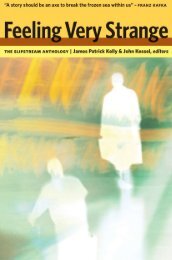The Curse of the Wer.. - Site de Thomas - Free
The Curse of the Wer.. - Site de Thomas - Free
The Curse of the Wer.. - Site de Thomas - Free
Create successful ePaper yourself
Turn your PDF publications into a flip-book with our unique Google optimized e-Paper software.
70 THE CURSE OF THE WEREWOLF<br />
and feminine traits in <strong>the</strong> psyche <strong>of</strong> every individual, male or female.<br />
Integral to this rethinking <strong>of</strong> gen<strong>de</strong>r was <strong>the</strong> notion that masculine<br />
psychology involves <strong>the</strong> repression <strong>of</strong> feminine traits in <strong>the</strong> unconscious,<br />
although Freud’s characterization <strong>of</strong> feminine psychology<br />
was more problematic, as evi<strong>de</strong>nced by his infamous claim that women’s<br />
sexuality is ‘a “dark continent” for psychology’. 20 In this sense, as Lynne<br />
Segal observes, he equated male psychology with human psychology<br />
‘from which women … are seen to <strong>de</strong>viate’. 21 Never<strong>the</strong>less, R.W. Connell<br />
suggests that Freud’s psychoanalysis was in fact <strong>the</strong> ‘first sustained<br />
attempt to build a scientific account <strong>of</strong> masculinity’. 22 For both Connell<br />
and Segal, Freud’s <strong>de</strong>scription <strong>of</strong> masculinity as a contradictory and<br />
unstable construct has been crucial to subsequent work on <strong>the</strong> subject.<br />
Fur<strong>the</strong>r, as Connell notes, Freud ‘provi<strong>de</strong>d a method <strong>of</strong> research,<br />
“psychoanalysis” itself; a guiding concept, <strong>the</strong> dynamic unconscious;<br />
a first map <strong>of</strong> <strong>the</strong> <strong>de</strong>velopment <strong>of</strong> masculinity; and a warning about <strong>the</strong><br />
necessary complexity and limits <strong>of</strong> <strong>the</strong> i<strong>de</strong>a.’ 23 <strong>The</strong> case <strong>of</strong> <strong>the</strong> Wolf-<br />
Man, with its lessons about ‘<strong>the</strong> tensions within masculine character’<br />
and its articulation <strong>of</strong> masculinity as ‘a complex, and in some ways<br />
precarious, construction’, was Freud’s most significant <strong>de</strong>monstration<br />
<strong>of</strong> this approach. 24<br />
Ultimately, Connell indicates that Freud’s work has ma<strong>de</strong> it difficult<br />
to separate <strong>the</strong>orizations <strong>of</strong> <strong>the</strong> psyche — and, in particular, <strong>of</strong> <strong>the</strong><br />
unconscious — from <strong>the</strong>orizations <strong>of</strong> masculinity. Because Freud’s conceptualization<br />
<strong>of</strong> <strong>the</strong> unconscious was <strong>de</strong>veloped through <strong>the</strong> analysis<br />
<strong>of</strong> masculinity (and, specifically, through <strong>the</strong> case <strong>of</strong> <strong>the</strong> Wolf-Man),<br />
<strong>the</strong> subsequent history <strong>of</strong> <strong>the</strong> unconscious converges at many points<br />
with <strong>the</strong> history <strong>of</strong> masculinity. Freud also gave <strong>the</strong> notion <strong>of</strong> <strong>the</strong><br />
‘beast within’ a more general scientific legitimacy which facilitated<br />
its entrenchment in fur<strong>the</strong>r discursive contexts, beyond <strong>the</strong> domains<br />
<strong>of</strong> religion and philosophy. Certainly, Dorothy Scarborough’s reading<br />
<strong>of</strong> <strong>the</strong> werewolf as an increasingly ‘psychical creature’ in her study<br />
<strong>The</strong> Supernatural in Mo<strong>de</strong>rn English Fiction (1917) documented <strong>the</strong><br />
streng<strong>the</strong>ning <strong>of</strong> a psychological approach to <strong>the</strong> notion <strong>of</strong> <strong>the</strong> ‘beast<br />
within’ since <strong>the</strong> fin <strong>de</strong> siècle:





